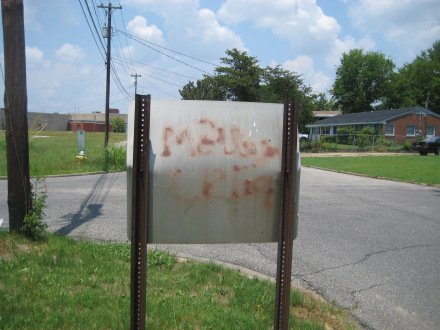Foster Dickson's Blog, page 81
April 7, 2016
TED Talk: Alice Goffman
After reading The New York Times Magazine‘s feature-length treatment of Alice Goffman and the controversies surrounding her book, On The Run, I was prompted to find out more about her and her work. Goffman is a sociologist-ethnographer-journalist person who embedded herself into a poverty-stricken black neighborhood while she was a students at the University of Pennsylvania, and her subsequent has drawn a lot of attention, both for its assertions and its methods. (This TED talk was mentioned in the article.) Though I’ve not read her book, Goffman makes some compelling arguments for criminal justice reform in America in this sixteen-minute talk.
Filed under: Education, Social Justice



April 5, 2016
April’s Southern Movie of the Month
1961 was a year of turmoil and change. The newly inaugurated president John F. Kennedy was dealing with the Bay of Pigs. The Freedom Riders were shaking things up in the South, taking interstate buses to New Orleans to test Jim Crow’s muscle. And in December, the Vietnam War began, as 400 US servicemen arrived by helicopter in Saigon. Amid this climate, the film adaptation of Lillian Hellman’s play “The Children’s Hour” was released, starring Shirley MacLaine, Audrey Hepburn, and James Garner.
Though we are never told where the film’s story takes place, we recognize the South immediately. (The playwright Lillian Hellman was from New Orleans, and her family had roots in Demopolis, Alabama.) But this is not the South of Bob Ewell or Quentin Compson or Scarlett O’Hara— this is a very different South where unmarried, well-educated women make their own choices and handle their business without the interference of men. Which sets up the conflict for the story.
In “The Children’s Hour,” best friends Karen Wright (Hepburn) and Martha Dobie (MacLaine) operate a boarding school for girls. In the early moments of the film, we see them scurrying about, getting the young girls ready for bed in the voluminous house where they all live and learn. The women are long-time friends and have gone into this venture together, with Martha in the lead. In one of their first conversations, while cleaning up the dishes with the school’s only other employee, Martha’s aunt Mrs. Lily, we learn that after two years the school is finally making a profit. The exhausted but happy women ponder what to do with the scant dollars they have long hoped to have.
In the early part of the film, we also meet two other characters who quickly become significant: Mary, the school’s manipulative bad girl; and Joe Cardin, a handsome young doctor who is Karen’s fiancee. As the scene unfolds for us, we understand Mary to be an instigator, an eavesdropper, and a liar. Ever on the lookout for ways to gain an upper hand, she discovers her schoolmate Rosalie’s theft of another girl’s jewelry, and she overhears an outburst from Martha who is upset that Karen wants to get married just as the school is getting on solid ground. Joe Cardin is the counterbalance to Mary’s predatory influences; he is continually level-headed, kind, and patient, only allowing himself minimalistic remarks about the unseemly situations that he sees.
The real plot develops in the wake of a seemingly minor event: Mary has come to class late, and has brought Mrs. Lily some flowers that she found in the trashcan outside as a way to butter up the vain old spinster. Mary claims that she picked the flowers herself, but Karen calls her on the lie. After an angered Mary cries foul then feigns a conniption, Dr. Joe comes to do his due diligence, but Mary demands to see her overly doting grandmother, who is also Joe’s aunt. As those three contend in the next room, Martha is also bickering with Mrs. Lily, and soon fires the quibbling woman, telling her to move out right away.
As a means of escape from punishment, young Mary fabricates a nuanced version of life at her school, one just factual enough to seem true, for her grandmother. She cites having overheard Mrs. Lily’s admonition to Martha that her attachment to Karen is “unnatural,” and she shares having seen Karen and Martha quarrel. As she is egged on by her grandmother’s curiosity, Mary makes the ultimate charge, through a whisper that the audience doesn’t get to hear: the two women who run her school must be lesbians.
Immediately appalled and shocked, grandmother Mary Tilford chooses not to confront Martha and Karen with the charges, but instead decides to inform all of the other girls’ parents, so they can get their children out ASAP! The girls are all withdrawn, one by one but immediately, as the two women are left to wonder why— until one girl’s father, in a fit of pacing nervousness, tells Karen. Then Karen tells Martha. Again, just as director William Wyler did with Mary’s whisper to her grandmother, we don’t get to hear what is said— but we know.
The happy scenario where the story began has totally crumbled: the nearly successful school now has no students, Mrs. Lily has been fired and told to leave, the ever-faithful Joe has to choose between his love for Karen and the will of the town, and the friendship of Martha and Karen is strained. Our completely innocent protagonists are left asking, what do we do now? The first order of business is to confront Mary and her grandmother.
In the charged argument at Mary Tilford’s house, young Mary is caught lying about what she claims she to have seen and heard, but covers herself well. She drags Rosalie into her lies, holding the fact of the stolen jewelry over Rosalie’s head. Young Mary now has another lying (and thieving) child corroborating her story, so the grandmother holds fast to her belief. The two schoolmistresses decide to sue Mary Tilford for slander.
The next time we see Karen and Martha, some time has passed. They have lost the slander lawsuit, and the scandal has been national news. The two cannot leave town, and they cannot stay; they have no options, no opportunities. Suddenly, out of the blue, Mrs. Lily waltzes in the door, home from being on tour with her theater group. She has surreptitiously ignored the summons to come to court to explain her “unnatural” comments, and her absence from court was taken as an affirmation that the accusations are true. Now, Mrs. Lily has returned, having evaded the storm, wanting her old job and old room back . . . but Karen and Martha are having none of it.
As the remaining parts of the women’s lives fall apart, including an ugly argument between themselves and another between Karen and Joe, all hope seems lost. However, one fortuitous circumstance changes everything: Rosalie’s mother, while packing her daughter for her new school, discovers the stolen jewelry. Though we don’t get to see Rosalie gush out the truth, we understand what the discovery means. Now, Mary’s world will implode too, as her lie exposed.
Realizing her massive error of buying into a spoiled child’s obfuscations, Mary Tilford comes to the school to make things right with the women whose lives she has ruined. Tilford had already gone to the judge, asked for reversal of the judgment, and wants to pay them damages. She also offers to print a retraction in the newspaper and call every parent to ask them to re-enroll their daughters. But it’s too little too late. Even if the truth were exposed now, who would bring their children back to the school? And where could they go with the money, now that their names had been smeared all over the nation?
The outside world has failed Karen and Martha. In stereotypical Red Scare fashion, once they were accused, they were guilty. And even once they were found to be innocent, they knew that society would still regard them as guilty. As the two women talk, trying to make sense of the whole thing, Martha lets another bombshell fly: she may well be a lesbian who has been in love with Karen. Martha cries hysterically, proclaiming that no matter what a judge or society says, she is “guilty” as charged. Not knowing how to take this news, Karen goes outside for a walk, but only gets as far as the front gate before she is called back by a frantic Mrs. Lily. Karen returns to the house, runs upstairs, smashes open Martha’s locked door, and finds where her friend has hung herself! After the sparsely attended funeral, Karen puts Lily in a taxi and strides away, chin up, past the smattering of on-lookers, and the film ends there.
When “The Children’s Hour” was released, its stars were enjoying major success. Audrey Hepburn had hits in the 1950s with “Roman Holiday,” “Funny Face,” and “Sabrina,” and “Breakfast at Tiffany’s” came out the same year, in 1961. Shirley MacLaine had had a hit comedy with “The Apartment” the year before, in 1960. And James Garner had a thriving career on TV, including his hit show “Maverick,” which ran from 1957 – 1962. Yet, these three big-name actors appeared in this film with such a controversial subject: the mistreatment of women thought to be lesbians. But don’t get too hasty about proclaiming their bravery.
In 1961, the nation was having enough trouble digesting the fact that long-oppressed African Americans hadn’t actually been happy all along, having this indictment of intolerance brought to the big screen must’ve been a shock, though that force was blunted by the veiled presentation. In her essay, “Decades of Denial,” Alison A. Grounds writes:
The Children’s Hour represents the first major film released in the United States to deal clearly with lesbianism. The nature of the depiction of the lesbianism in this film reflects the type of images that were considered tasteful to American audiences in the early 1960s. Hollywood was ready to release a film with lesbian content as long as lesbianism was treated as an unhealthy condition with no opportunity for happiness.
In short, not everyone fell in love with this movie. Though some audiences may have disagreed, The New York Times‘ critic Bosley Crowther found “several glaring holes in the fabric of the plot,” the characters’ hasty and overzealous actions unbelievable, and had this to say of the theme: “So this drama that was supposed to be so novel and daring because of its muted theme is really quite unrealistic and scandalous in a prim and priggish way.” However, being reminded of the Southerners of the late 1950s and early 1960s, this portrayal isn’t too far off: accused meant guilty, suspicion meant ostracism, and different meant untouchable. No, in the Deep South, this reaction to a delicate matter like non-normative sexuality would have been realistic, if the actual notion were spoken of by a child witness who provided specifics.
While some critical responses about the play-turned-film focus on the effects of slander and lies, that’s only scratching the surface of it. Sure, the child Mary lies about Karen and Martha and destroys their lives— but we have to look at what she chooses to lie about. Mary’s lie involves an non-negotiable taboo in the post-war, pre-Civil Rights, pre-women’s movement Deep South. Mary wasn’t satisfied with leveling normal charges about mistreatment or favoritism; she dropped a bomb, one that was sure to incite a definite, hostile response from the conservative adults she understood well. This movie may be about lies and their effects, but it is also about intolerance and its effects. Those conservative parents would have yielded to Karen and Martha doling out discipline, but they would never answer with deference to the insinuation that the two women were lovers. That defied every social construct of the Deep South’s patriarchal, Protestant culture. What is impressive about the movie version of “The Children’s Hour” is not only that it tackled that issue at that time, but that Hellman’s play was written and produced even earlier, in the 1930s.
Decades before the Civil Rights movement, white liberal Southerners recognized the hypocrisy of their culture, and acted on that recognition in various, often understated ways. In PBS.org’s biography of Hellman, it is written: “her plays were a constant challenge to injustice,” and
Lillian Hellman will be remembered not only as an activist, playwright, and memoirist, but as a woman who could overcome the hurdles of her time and succeed on her own terms.
“The Children’s Hour” is an excellent example of that very thing.
Filed under: Film/Movies, Social Justice, The Deep South



April 3, 2016
A writer-editor-teacher’s quote of the week #113
This is an enviable life, to live in the terrain of one’s own heart. Most writers don’t – can’t – do it. Most of us are always searching, through our work and in our lives: for meaning, for love, for home.
– from “Finding My Way Home” by Lee Smith, in in the February/March 2016 issue of Garden & Gun magazine
Filed under: Literature, Reading, Teaching, Writing and Editing



March 31, 2016
Re-Run: “Patchwork,” April 2010
This post was originally published on the blog for “Patchwork: A Chronicle of Alabama in the New South,” my Surdna Foundation Artist Teacher Fellowship project in 2009 and 2010.
Wednesday, April 21, 2010
A Chronicle of Alabama in the New South
This term, the “New South,” nests precariously between being an anomaly and an ideal, between a cruel joke and a wild hope, between a vicious lie and a half-hearted effort at improvement. As far as I know, the term came from newspaper editor Henry Grady. He was trying to say that the South had changed . . . and that it should even more. Of course it became abundantly clear after Reconstruction was over that yes, the South had changed, but had only become less overt and more insidious in its racist ways. The next incarnation of the “New South” came after World War I, then again after the Depression, then again after the Civil Rights movement. The last time it seems to have stuck. Though nobody would surmise that our old problems have been solved completely.
I hesitated to subtitle this project with the term “New South.” I don’t like the historical connotations of its repeated failure to live up to its promise. But I do agree with people like Glen Browder who say that we are moving forward— maybe just inching forward, but moving forward nonetheless.
There is an old saying, “Many hands make light work.” I liken the changing of Alabama to moving a house. If you strap one guy to it and make him pull, he could work all day every day but it will probably never move. But if he goes around its foundation and loosens it up . . . and then if you add more people who are pulling . . . eventually slow progress will be made. And if you add even more people to pull, and the right leverage mechanisms are put into place, those people can move that house, without the help of a crane or a truck.
Alabama is the same way. If enough people sit back suspiciously and full of cynicism, saying, “They’ll never move that house,” then those cynical people are probably right. But if the people who want to see something change will get on board, abandon apathy and cynicism, and work for change, it can happen. The Civil Rights movement proved that.
I was pleased to hear it and didn’t expect it, when I watched Conan O’Brien’s last episode of The Tonight Show and he said that nothing pisses him off more than cynicism, because cynicism is completely useless. He said, if you’re not going to work to do good things, then get out of the way for people who are, and don’t bash them for doing it. He said that people who spend their energy impeding good work are the worst kind. Alabama is a lot like that, only it is masked by terms like “conservative” and “Alabama values.” These coded messages mean: “We’re not going to change anything,” and “We’re going to stand defiant against anything different from us.” It’s cynicism. In Alabama, we watch systemic failures in our state and refuse to change, and then many Alabamians bash the people who try to change it.
I wanted to write about the things I have been seeing for a long time— a real “New South.” I have known lots of people, born and raised in Alabama, who are not those cynical people. They are musicians and skaters and entrepreneurs, writers and teachers and organizers, artists and librarians and historians, architects and preachers and photographers, divers and kayakers and meth-lab busters. I have known these people who are working not to let those cynics ruin this state. But you don’t hear much about them, because the national news media only wants to talk about our football teams, our corrupt politicians, and our weirdo-freaks. Well, I don’t hear much about the good people of Alabama either, so I spent a year out looking for them, and remembering the ones I had known for years, and thinking of a way to tell more people about them. That’s the “New South” I’m talking about— a place full of progressive people who want to leave all the bullshit of the past behind, but nobody has organized them all yet.
Filed under: Alabama, Bible Belt, Black Belt, Sun Belt, The Deep South, Writing and Editing



March 29, 2016
Deep Southern Gardening Mysteries #10 and #11
Last week, my daughter and I went hiking in Chewacla State Park, near Auburn, and I stopped to look at both of these plants. Since I found the Pl@ntNet app, I’ve had help identifying things when I didn’t know what they were, but I’m not sure about the app’s answers this time.
The first one was scattered about on the floor of the wooded areas. Once or twice while we hiked, I did see it in clusters of a dozen or so, but it was usually by itself. Some were in shady areas and others in the sun. Pl@ntNet told me it is Virginia creeper, but it was wasn’t climbing anything, like that plant usually does, and in my yard I’ve never seen it flower. Anybody know what this is?
The other one was also low to the ground, always in sunny spots, and mostly near the edge of the little reservoir at the park. It appeared in clusters, but the individual plants were not close together. Any guesses?
Filed under: Alabama, Gardening, The Deep South, The Environment



March 27, 2016
A writer-editor-teacher’s quote of the week #112
Run fast, stand still. This, the lesson from lizards. Observe almost any survival creature, you see the same. Jump, run, freeze. In the ability to flick like an eyelash, crack like a whip, vanish like steam, here this instant, gone the next— life teems the earth. And when that life is not rushing to escape, it is playing statues to do the same. See the hummingbird, there, not there. As thought arises and blinks off, so this thing of summer vapor; the clearing of a cosmic throat, the fall of a leaf. And where it was— a whisper.
What can we writers learn from lizards, life from birds? In quickess is truth. The faster you blurt, the more swiftly you write, the more honest you are. In hesitation is thought. In delay comes the effort for a style, instead of leaping upon truth which is the only style worth deadfalling or tiger-trapping.
– from Zen in the Art of Writing by Ray Bradbury
Filed under: Teaching, Writing and Editing



March 24, 2016
The Passive Activist, a recap
We Americans are living with an unprecedented absence of leadership. In the Deep South, we have lived with this void for most of our history, so we’re a little more used to it than the rest of the nation— but that doesn’t make it OK. In the face of Congressional deadlock, soaring national debt, secular/religious strife, rogue policy actions by state legislatures, mistrust of the police, declines in public education funding, exorbitant college costs, internet predators and trolls, crumbling labor unions, global warming, and the ultimate insanity of all: the elementary-school child pick-up . . . the Passive Activist series offers ideas for how ordinary people can create and implement positive change in our own lives. Movements are made up of people.
Since last November, I’ve been writing these Passive Activist posts. In case you’ve missed any, here’s a recap. Just click on the red title to go right to it.
Passive Activist, an introduction: Vote.
Passive Activist #2: Join a parent-teacher organization.
Passive Activist #3: Read poetry.
Passive Activist #4: Don’t bag your leaves.
Passive Activist #5: Support and patronize public libraries.
Passive Activist #6: Stop using disposable razors.
Passive Activist #7: Understand the difference between Democrats and Republicans.
Filed under: Civil Rights, Education, Local Issues, Poetry, Social Justice, Voting



March 22, 2016
National Poetry Month: Three Mondays
April is National Poetry Month: that thirty days in spring that provided the time stamp for Chaucer’s “Canterbury Tales,” that same thirty days that Eliot called “the cruellest month” in “The Waste Land.”
Here in Montgomery, for the last few years, a small group of us literary and professorial types put on a poetry program that features a different event each Monday. The schedule for this year’s program goes like this:
April 4: poetry workshop with Tony Crunk
Auburn University at Montgomery @ 7 PM, No cost
Participants should submit one poem in advance for consideration.
April 11: Jacqueline Trimble reading
Booker T. Washington Magnet High School @ 7 PM, No cost
Trimble will read from her forthcoming collection, American Happiness.
April 18: Readings by local poets
KRU on Mount Meigs @ 7 PM, No cost
Three local poets will read original works.
Filed under: Literature, Local Issues, Poetry, Reading



March 20, 2016
A writer-editor-teacher’s quote of the week #111
[ . . . ] “sounds better” is rarely justification for an editorial change. Because the author has the final say on all changes that are not actual errors — facts, grammar, spelling — the editor must state the case for his suggestions convincingly.
— from “Line Editing: Drawing Out the Best Book Possible” by Maron L. Waxman, in Gerald Gross’s Editors on Editing, third edition (1993)
Filed under: Teaching, Writing and Editing



March 17, 2016
TBT: Motley Crüe
Back in the early 1980s, my parents were among a small group who started a neighborhood watch program called the Normandale Association. They worked to get our neighbors organized, to keep a look out for suspicious characters , etc. Once the program was in place, my dad went and put the metal neighborhood-watch sign near the edge of the neighborhood, and almost immediately, someone came along with red spray paint and wrote “Motley Crüe” across the back of it. My dad was furious! Thirty years later, when I drove through my old neighborhood, that sign was still there— and so was Motley Crüe.

Filed under: Alabama, Local Issues, Music, The Deep South








